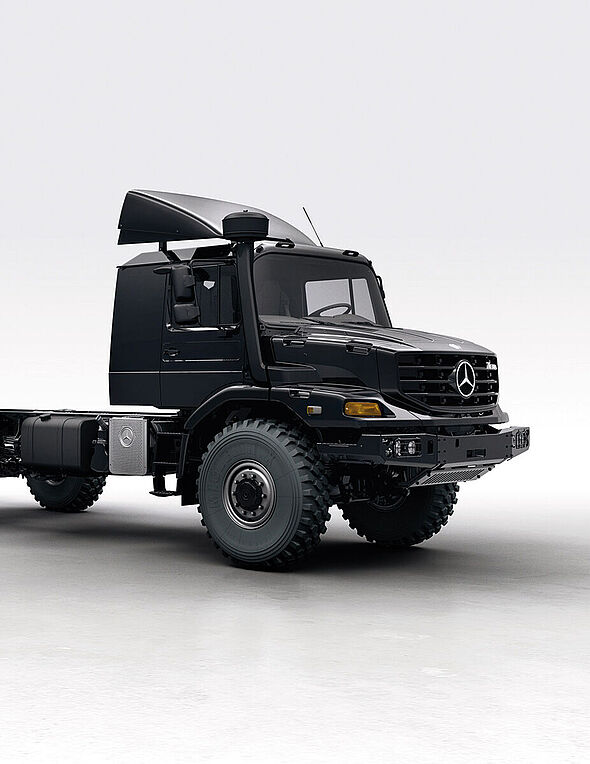Mercedes-Benz-Lkw
Ingenics Contributes to Successful Restructuring of Europe’s Largest Truck Factory at Mercedes-Benz Trucks in Wörth
Wörth truck factory: more series of vehicles, a wider range of variants, and more market opportunities
Mercedes-Benz Trucks, a division of Daimler AG, operates Europe’s largest truck plant in Wörth, Rhineland-Palatinate. Since size alone is no guarantee for sustained success, there are ongoing efforts to tailor every aspect of the product portfolio to customers’ needs. Ingenics was instrumental in meeting production technology requirements to ensure an almost unprecedented customer focus. The “Factory 2010” concept includes a whole package of measures based on an integrated, holistic idea.

- Qualified feasibility study created within seven weeks
- Decision-making framework for technical and organizational integration of the S2000
- Defined areas for action and measures for integration
In Wörth, southern Rhineland-Palatinate, Mercedes-Benz Trucks (Daimler Trucks) builds each vehicle series in Europe’s largest truck factory. Cabs for the Actros, Atego, Econic, Zetros, and most Unimog vehicles are also manufactured here. Although size plays a key role in the automotive market, it does not provide a guarantee for long term success. For this reason, management is constantly working to ensure that the product portfolio remains focused on customer needs, ensuring that the ideal vehicle can be produced for every purpose. In recent years, Ingenics has played an instrumental role in meeting production technology requirements for this new offensive, resulting in an almost unprecedented customer focus.
When the traditional Unimog brand was relocated from Gaggenau to the Mercedes-Benz plant in Wörth in 2002, two product lines were being manufactured there: the U 300, U 400, and U 500 off-road professional equipment carriers with a permissible total weight of 7.5 tons and above, and the all-terrain U 3000, U 4000, and U 5000 utility and towing vehicles. At the time, the Econic series was also added to the production program as an initial step, although it was not intended to remain. A feasibility study was commissioned to determine the conditions under which two additional vehicle types could be built on the same assembly line. This investigation was carried out by Ingenics.
Initially, production was planned for the compact Unimog U 20 and Mercedes-Benz Zetros, built for heavy-duty off-road operation and designed to close the gap between heavy trucks and the all-terrain Unimog. Thanks to its especially versatile profile, the Zetros – ever since it was launched in 2008 – has occupied its own market segment with a wide variety of vehicle types and corresponding sales figures. With an output of 240 kW (326 hp) and a total weight of 18 tons (two-axle) or 27 tons (three-axle), Mercedes-Benz Trucks had always had an eye on military applications as well as special fields of use such as disaster control, firefighting, and heavy industry.
The feasibility study carried out by Ingenics was a major source of help when clarifying and implementing assembly requirements for different vehicle types on the same production line. The results of this study were used to inform both production planning and logistics planning, making it possible to achieve the desired result. To great satisfaction of everyone involved, the restructuring project was largely carried out in the form of organizational measures, meaning that no major investments were necessary.
Soon after successful start of production, the “Factory 2010” concept, as it became known all over the world, made it possible to build all five Mercedes-Benz truck product lines in parallel on the same production line. The ensuing challenges, which are not commonplace for models with a wide range of variants, can be overcome thanks to definition and implementation of a comprehensive package of measures that form an integrated holistic concept:
- Two pre-assembly lines for cabs and frames lead to a main assembly line.
- Pre-assembly stations close to the line and a significant reduction in space requirements minimize the complexity of production logistics.
- Cycle time reduction – 14.3%.
- Picking rate increase from 30% to 70%.
- Logistic area reduction in production 30%.
- Creation of a learning island and “multiplier” concept for the qualification of assembly workers.
- Reduction of container range in production by 35%.
The project to restructure production for special vehicles at the Wörth site allowed Mercedes-Benz Trucks to pave the way for the future, which will be characterized by growing demands in a highly flexible production structure, ensuring successful production of complex products with the highest level of variance. The company is well equipped to face additional requirements and market developments for heavy-duty special vehicles.